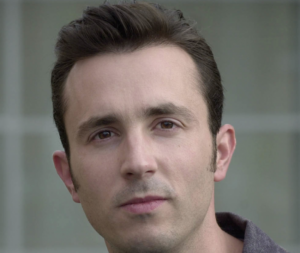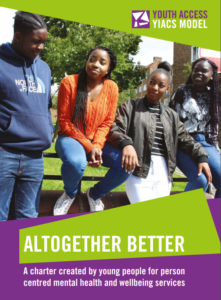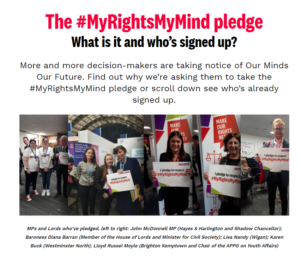Continuing our series of blogs for #childrensmentalhealthweek James Kenrick (@JamesKenrick1), CEO of Youth Access, argues that a rights-based approach to service design and quality will empower both young people and practitioners to achieve a common cause: the ‘humanisation’ of youth mental health services. These topics will be discussed in our twitter chat on 12 February at 8pm UK time. Please join us using #ebnjc.
Karim didn’t have an easy time growing up. He was referred to CAMHS at age 16 when he began experiencing strong suicidal thoughts, however before his assessment was scheduled his 17th birthday passed, and he was told he was ineligible for support. When he was finally met by the Adult Community Mental Health Team, he was refused treatment. He persevered in his quest for help, but six assessments later no support was forthcoming. As his symptoms worsened, his family were eventually forced to shell out for expensive private therapy, despite having scant resources to do so.
We are all familiar with such stories of young people failed by a mental healthcare system that sees them only as cases to be filed, rather than individuals with unique needs. And let’s be clear: it’s the system that is to blame for this malaise, not frontline staff. Most nurses and other practitioners in mental health services are working heroically to support their young patients in the face of what must feel like a mountain of systemic challenges: inadequate resources and staffing; political targets with perverse incentives; pressure and bureaucracy heaped on by managers. This system ends up placing more value on clinical expertise and managerial targets than on improving the quality of young people’s experiences through building trust, listening and responding to what matters to them.
This situation is in nobody’s interests. The result is patients dissatisfied by their experiences of a dehumanised service and staff equally unhappy at operating in a dehumanised environment. We therefore have a common cause to ‘humanise’ mental health services to ensure they are providing young people with a good experience of care. The humanisation of services involves recognising that it is the relationship itself that is the valuable thing about the service; that effective relationships are not an added extra, but are central to the delivery of effective services; and that increasing the effectiveness of relationships is therefore a lever for improving quality and performance.
Fortunately, we already have a framework to help us conceptualise a new, humanised approach to mental health services in the form of international human rights agreements that the UK has signed up to. The UK’s recognition of the human right to healthcare dates back to the 1976 International Covenant on Economic, Social and Cultural Rights, and was built upon with the more recent UN Convention on the Rights of Persons with Disabilities in 2007. The latter emphasises the need for a move away from diagnostic approaches which favour medication and institutionalisation in favour of an asset-based approach that treats each individual, along with the family and communities involved in their care, as knowledgeable and equitable players in decisions affecting them. Together these international agreements present four interrelated and essential principles underlining each person’s right to healthcare: availability, accessibility, acceptability and quality.
Taking these principles as a starting point, we can begin to address what is the key gap in provision exposed by stories like Karim’s: services meeting the specific and expressed needs of young people accessing support independently of their parents or carers. Too many young people in the UK face long or never-ending waits for gatekept services that fail to provide age-appropriate support for young people transitioning into adulthood. How much better would Karim’s experience of the mental health system have been had he – and all young people in the UK – had early access to responsive support built around young people’s needs rather than the system’s? In other words, a humanised system with young people’s inalienable rights at its core.
Unsurprisingly, this is exactly what young people themselves are calling for, and they’re doing so increasingly vocally. At my charity Youth Access, we have focused in the last few years on empowering young people with lived experience of the mental health system to be at the forefront of campaigning for its transformation. In 2017 we worked with young people to produce the Altogether Better Charter, a set of seven key demands for young person-centred mental health and well-being services. Out of this project was born a new movement, Make Our Rights Reality, led by young people committed to rights-based social action, campaigning for policymakers and NHS decision-makers to pledge to respect the rights of young people in the UK to access better support for their mental health. Pledgees that have committed so far include civil society minister Baroness Diana Barran, Shadow Chancellor John McDonnell and Labour leadership hopeful Lisa Nandy.
We know there are plenty of practitioners in youth mental health services seeking the exact same change as young people are demanding – and that, just like young people, practitioners also need to be empowered to cut through the systemic barriers to change. This will require collaboration between practitioners, commissioners, voluntary sector providers and young people to co-produce services that are going to be more effective (and cost-effective) than they are at present. This includes co-production at both an individual therapeutic level – such as through shared decision-making between patients and practitioners – and, crucially, at a broader service design and commissioning level, with decision-makers genuinely sharing power with young people.
Last month we launched a new National Lottery-funded project that will work with partners across the UK to bring young people, mental health professionals, commissioners and voluntary sector providers together to co-design mental health and well-being services that are more responsive to the needs of young people. As part of the programme, we will be providing opportunities for practitioners across the country committed to humanising services to work together with young people to realise the rights of young people in their care. I’d encourage any mental health practitioners reading to make sure they receive updates on the project by signing up to our My Rights mailing list here.
By building a system that takes the principles of the human rights approach as a starting point, we can focus back on the fundamentals of high quality care – trust, relationships and the quality of experience – and humanise youth mental health services.



